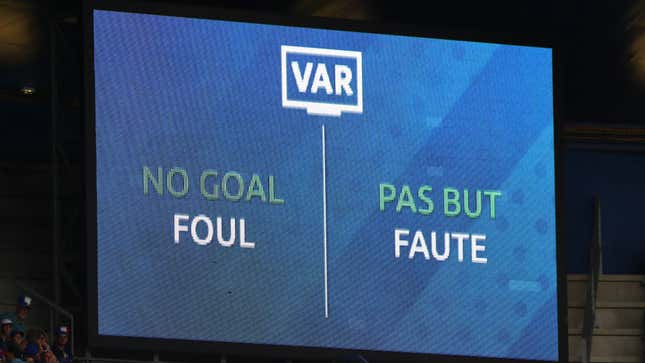
The most common complaint against VAR—or any form of video review in sports—in one of aesthetics. If referees insist on stopping the game for several minutes to double check every key play, the thinking goes, all the drama and intensity and emotion of the biggest moments will be lost, and the celebrations of fans will be replaced by hesitance and trepidation while they wait to confirm that what they just saw with their own eyes actually happened.
It’s a fine argument, one that at least a strong minority of sports fans would agree with. But most leagues around the world have chosen to ignore it. If the game gets delayed for a bit, they’ve decided, that’s okay, because it’s a small price to pay to avoid controversy and make sure officials are making an objectively correct call.
But what if video replay can’t even do that? At the 2019 World Cup, it’s been a fair question to ask. While the use of VAR has been clunky simply for pace-of-play reasons, and the problems that arise when players are confronted with a strict, slow-motion interpretation of the rulebook, VAR has also shown that it can’t even accomplish its stated mission. If the goal of VAR is to help the referee make calls that are clear, accurate, and uncontroversial, the system is failing miserably, and Sunday’s Brazil-France game showed just how little VAR is doing to fix the officiating debates and questions that have been a part of soccer forever.
In the first half of that quarterfinal match-up, it looked like France’s Valérie Gauvin broke the scoreless deadlock by scoring a messy, painful goal while colliding with Brazil’s goalkeeper. It was ruled a goal on the pitch and then sent to VAR, but Fox’s rules analyst, Christina Unkel, didn’t think the call should be overturned.
Here’s what she said:
UNKEL: What they’re giving her is an indication, as to the check point, is whether the keeper had full possession in her hands when contact was made. To me, I don’t think this is a clear and obvious error, so I’m surprised that they actually sent this down. There’s an argument either way whether she had full possession of the ball. I think the goal is good. I think it should stand.
DANIELLE SLATON: This isn’t a question of whether it came off the arm of Gauvin at all?
UNKEL: You have to actually have possession on it. So, there’s a general rule of thumb: Does she have the possession and control of it when she has her hand on the ball. Here, because she’s just putting her hand in there and there’s a collision, there’s a grey area here to be had. I don’t think she has possession in my opinion.
Not 10 seconds later, the VAR review reversed the goal because of a foul. This isn’t Unkel’s fault, and the point here isn’t to point out any mistake she made. Rather, when the freakin’ rules analyst can’t even look at the same replays the ref is looking at and come to the same conclusions as her, it should be crystal clear just how impossible it is for VAR to do its job.
This wasn’t the first time in the tournament that a VAR call that was open to interpretation added to a match’s controversy instead of eliminating it. There was also Brazil’s own goal in their group stage match against Australia, where people disagreed about whether or not an offside Sam Kerr affected the play. Or Tobin Heath’s goal against Sweden, which a lot of people thought should have been called back because Carli Lloyd was offside.
There’s something to be said for having an extra official look at a play very quickly, ideally in real time and not slow-motion, to reverse any kind of egregiously bad call that a referee is bound to make now and then because of human error. But these constant, long delays that hinge on the subjective interpretation of an individual looking at 20 replays in perception-warping slow-motion have no benefits. After these reviews—in which the call could reasonably go either way—no one is happy or satisfied, nobody is entertained, and nothing has been solved.